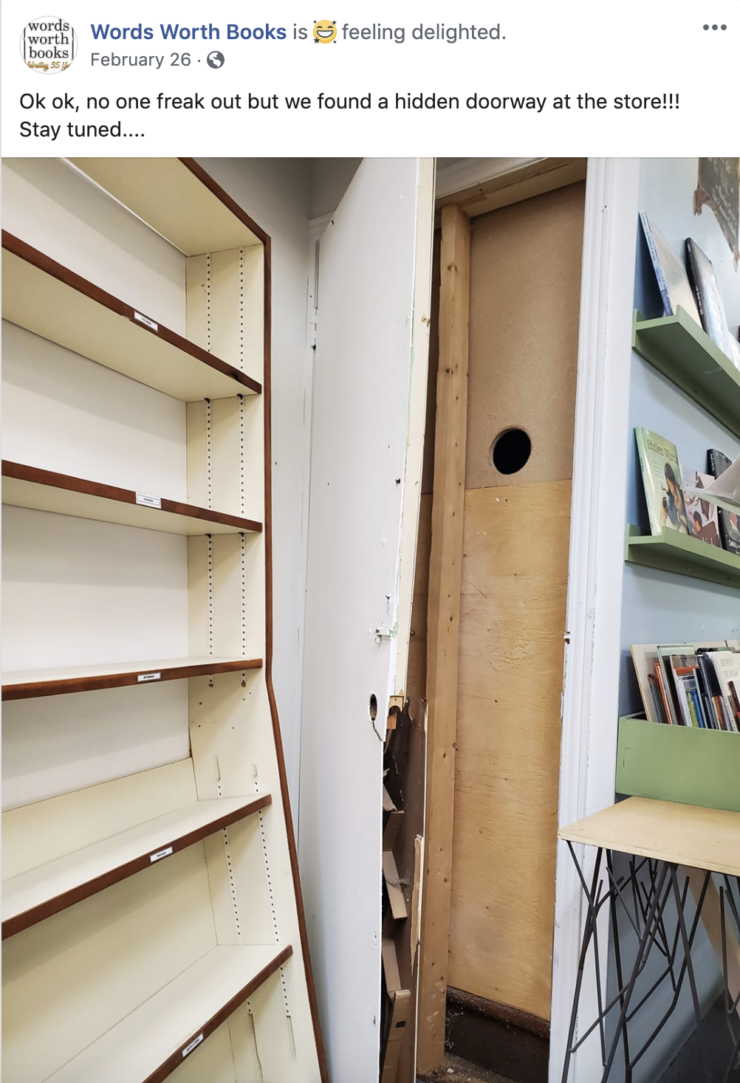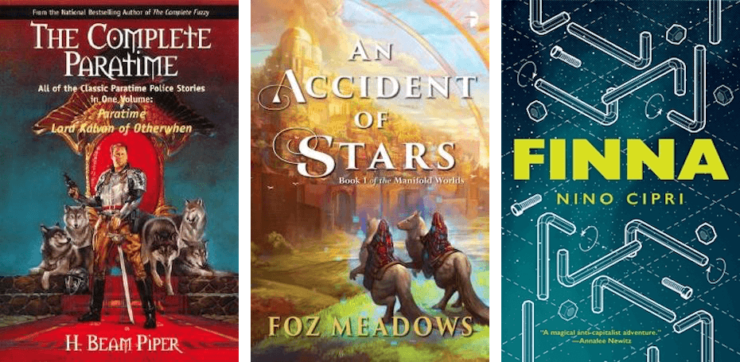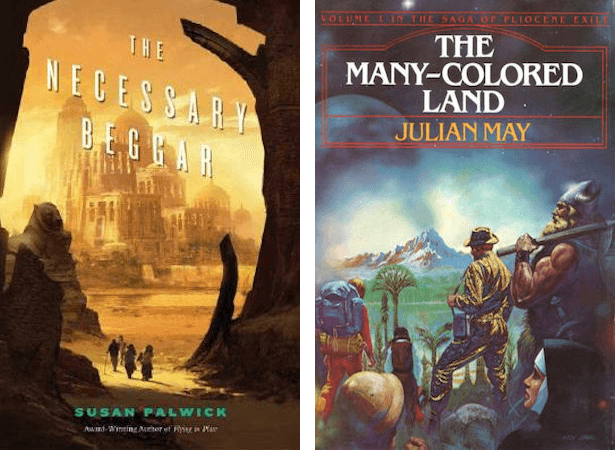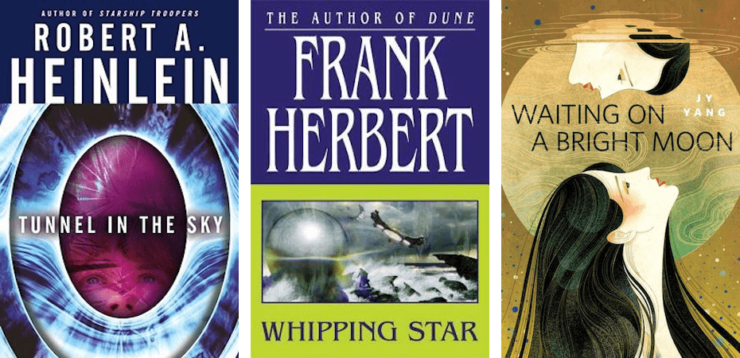Local bookstore and cultural icon Words Worth Books were in the midst of renovations when they were surprised to discover a door—a door no one had known was there! Now, the bookstore has been at 96 King Street South, Waterloo for more than thirty-five years, which makes one wonder when and how this door was constructed (or arrived).
As anyone who reads science fiction and fantasy can tell you, life is full of doors like that: appearing unexpectedly, leading to unexpected places. Other worlds, other times. Narnia. An alien planet. The Bronze Age.
Imagine finding the door into Sumer.

Andre Norton understood the potential in doorways. A door could lead you from post-War Europe to the Witchworld, from a world where one is but an unwanted double to one where one can be a savior, from the world we know to ones where history played out very, very differently. In fact, portals and doorways are so common (see Judith Tarr’s ongoing Norton Reread series) that it’s odd none of her interstellar empires ever seemed to make use of them.
Portals tend to fall into two basic varieties: the ones where the traveller has some idea what is on the other side and the ones where they do not. Trips through them likewise fall into two basic categories—voluntary and involuntary. Here are some examples of science fiction and fantasy stories that feature different types of portals and passages…
Unknown Destination/Voluntary Passages

Why would someone willingly step through a mysterious portal without some idea of what lies on the other side? (Some might say that’s Narnia your business.) Either there’s something chasing the traveller that makes a blind leap seem like a sensible risk, or the call of the unknown is irresistible.
In Jo Clayton’s novel Skeen’s Leap, Skeen has found herself in quite the pickle. She’s been marooned by lover Tibo on Kildun Aalda. It’s just a matter of time before Skeen’s colorful past catches up with her and she ends up in prison or dead. A blind leap through an ancient alien portal is risky, but risk is better than her certain fate on Kildun Aalda.
Carter Horton, protagonist of Clifford D. Simak’s Shakespeare’s Planet, travels to the eponymous planet the hard way, through sublight travel combined with cold sleep. He wakes in a time in which interspace “tunnels” (a portal network linking much of galaxy) offer a faster alternative. Too bad that the mysterious builders did not see fit to leave a directory or even an FAQ for the tunnel system. Brave pilgrims like the alien Carnivore and the human Elayne are methodically mapping the tunnel network on foot. The world on which Horton wakes is an oddity: a tunnel leads into it, but egress is barred. Why? Well, that would be telling…
In Alix E. Harrow’s remarkable debut novel, The Ten Thousand Doors of January, January Scaller owes her comfortable childhood to her father’s wealthy employer, Locke. When January’s father dies in a foreign land while on one of Locke’s errands, Locke assures the young girl that he will serve as her guardian. Then the bookish girl stumbles over certain texts Locke should have locked up. January begins to suspect that she has abilities valuable to Locke and that far from being a beloved ward, she is merely a treasured possession. But there are doors that can offer someone like January an escape from her kindly jailor.
Unknown Destination/Involuntary Passages

Even if one has no intention of stepping through a portal, circumstance may nevertheless send you through one. Take diplomat Benjamin Bathurst, protagonist of H. Beam Piper’s short story “He Walked Around the Horses.” Bathurst had no idea it was possible to step from one world to another until he managed the trick. Unfortunately for Bathurst, the world he finds himself in is a dangerous one, and he has no idea how to return home…
In Foz Meadows’ An Accident of Stars, Saffron Coulter didn’t choose to wander through an interdimensional hole. Too bad it’s a one-way trip. Goodbye to all her friends and family! Worse yet, she is trapped in Kena, a fantasy kingdom on the brink of civil war. Saffron may not have to miss her loved ones for long.
Nino Cipri’s Finna offers a compelling reason for venturing through a hole in reality to face god knows what dangers: it’s to keep the stockholders happy. IKEA-esque furniture chain LitenVärld has a problem: portals randomly appear in their big box stores—holes in reality that send valuable patrons to alien worlds. No worries! LitenVärld is well supplied with poorly paid employees who will obey orders to follow the missing customers down the rabbit hole. They are to rescue their unfortunate customers, find reasonable replacements, or die trying.
Known Destination/Involuntary Passages

Gateways and portals are not merely doorways to adventure. There’s no oubliette as convenient as a rift in time or space down which one can dispose of unwanted enemies, rivals, oppressed minorities, or just the unlucky.
In Susan Palwick’s Necessary Beggar, the city of Lémabantunk sends convicted murderer Darotti and his entire family through a one-way gateway to another universe, to an alien nation calling itself America. It’s the end of the matter as far as Lémabantunk is concerned. For Darotti’s family—father Timbor, sister Zamatryna, brother Macsofo and the others—it is the beginning of a painful struggle to find a niche in a nation implacably hostile to newcomers.
In Julian May’s The Many-Colored Land, Earth and indeed the whole Milky Way are firmly controlled by the Galactic Milieu. A one-way time gate back to the Pliocene offers escape from conformity. Exiles are sterilized and forbidden to export high technology; the Milieu has no desire to see its history rewritten. As the Pliocene Exiles discover, Earth’s pre-history is far more poorly documented than the Milieu knows. No bucolic paradise waits. Instead, the exiles find alien slavers and a brutal civil war.
Known Destination/Voluntary Passages
 A portal that will take you somewhere known has clear utility, particularly if that somewhere is pleasant. Even better if said portal will let you return. No need to worry about roads or rockets when convenient doorways are at hand. If the portals work according to spec, that is….
A portal that will take you somewhere known has clear utility, particularly if that somewhere is pleasant. Even better if said portal will let you return. No need to worry about roads or rockets when convenient doorways are at hand. If the portals work according to spec, that is….
Interstellar gates provided the Earth of Robert A. Heinlein’s Tunnel in the Sky with an escape from Malthusian doom. They also provide a plucky teen like Rod Walker with the chance to test his survival training against an authentic alien world. The plan is a brief sojourn, after which the surviving students can return to their family. The reality proves quite different. The return gate fails to appear on schedule, forcing the kids to find some way to survive on an alien world or die trying.
The Caliban Jumpdoors featured in Frank Herbert’s Whipping Star are not an escape from demographic doom. They are merely enormously convenient, permitting the denizens of the ConSentiency to step from one world to another without all the bother of starships. It falls to Bureau of Sabotage agent Jorj X. McKie to discover that jumpdoors have an undocumented feature: if the Caliban controlling a jumpdoor dies, every being who ever stepped through that door will die. That’s bad enough. But there’s more: every jumpdoor in existence is controlled by a Caliban called Fannie Mae; virtually every adult in the ConSentiency has used a jumpdoor at least once; now someone is doing their very best to kill the Caliban.
The Imperial Authority controls the teleport network in JY Neon Yang’s Waiting on a Bright Moon. The Authority does its best to control everything. It’s inconvenient that the ansibles crucial to the network are living people like Ansible Xin. The Authority chooses to rule them by fear: transgression is punished harshly. Even suspected transgression is punished harshly; innocence is no protection. Xin is suspected and realizes that she has nothing to lose by throwing her lot in with the rebels.
I have probably forgotten to mention some relevant novel or short story that you hold dear. You can tell me about it in comments below…
In the words of Wikipedia editor TexasAndroid, prolific book reviewer and perennial Darwin Award nominee James Davis Nicoll is of “questionable notability.” His work has appeared in Publishers Weekly and Romantic Times as well as on his own websites, James Nicoll Reviews and Young People Read Old SFF (where he is assisted by editor Karen Lofstrom and web person Adrienne L. Travis). He was a finalist for the 2019 Best Fan Writer Hugo Award and is surprisingly flammable.










